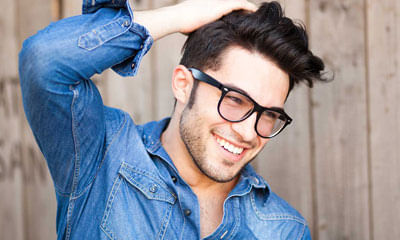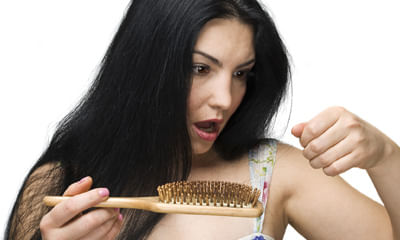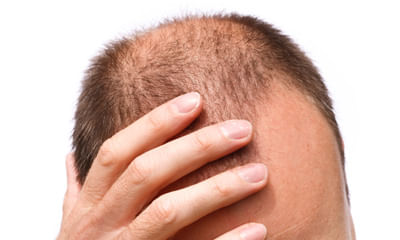Does Hair Grow Back After Seborrheic Dermatitis
How to get rid of alopecia and dandruff as I have not yet done any treatment please do reply. ...
Ask Free Question
Hello, you mean alopecia areata? alopecia areata is a type of hair loss that occurs when your immune system mistakenly attacks hair follicles, which is where hair growth begins. Alopecia areata usually begins when clumps of hair fall out, resulting in totally smooth, round hairless patches on the scalp. In some cases the hair may become thinner without noticeable patches of baldness, or it may grow and break off, leaving short stubs (called" exclamation point" hair). In rare cases, complete loss of scalp hair and body hair occurs. The hair loss often comes and goes-hair will grow back over several months in one area but will fall out in another area. You are more likely to have permanent hair loss if you: have a family history of the condition. Have the condition at a young age (before puberty) or for longer than 1 year. Have another autoimmune disease. Are prone to allergies (atopy). Have extensive hair loss. Have abnormal color, shape, texture, or thickness of the fingernails or toenails. Medication: take homoeopathic medication which is safe to take and you will start getting the results within few days to few months - acid fluor. 200 to be taken twice a day daily for 1 month. Revert back for further guidance. For dandruff: seborrheic dermatitis is also called dandruff, seborrheic eczema and seborrheic psoriasis. It isn't contagious, and it's not a sign of poor personal hygiene. Few self-care tips can help you control and manage seborrheic dermatitis (dandruff): soften and remove scales from your hair. Apply mineral oil or olive oil to your scalp. Leave it in for an hour or so. Then comb or brush your hair and wash it. Wash your skin regularly. Rinse the soap completely off your body and scalp. Avoid harsh soaps and use a moisturizer. Avoid products that contain alcohol. These can cause the disease to flare up. Wear smooth-textured cotton clothing. This helps keep air circulating around your skin and reduces irritation. If you have a beard or mustache, consider shaving it off. Seborrheic dermatitis can be worse under mustaches and beards. If this is the case for you, shaving might ease your symptoms. Avoid scratching. Scratching can increase irritation and your risk of infection. Gently clean your eyelids. If your eyelids show signs of redness or scaling, wash them each night with baby shampoo and wipe away scales with a cotton swab. Warm or hot compresses also may help. Use lukewarm water for head wash. Medication: take homoeopathic medicines - schwabe's badiaga 200 & alfalfa tonic twice a day for 1 month and revert. Use schwabe's anti-dandruff shampoo and anti-dandruff oil regularly as per the condition of your scalp (minimum 3 times a week). After shampooing, use bakson's arnica hair conditioner as well after every head wash. Apart from this, you can take one tablet of multivitamin folli hair once daily for 1 month.
My name is sachin kashyap my problem is hear faal and dandraf for my hear please for my helf. ...
Ask Free Question
In general, you lose about 50-100 strands of hair each day, but the loss is not visible as new hair grow in their place. However, if you lose more than a 100 strands in a day and more than 200 strands on the day you shampoo, you may be suffering from what is known as excessive hair fall. Certain factors or reasons may cause you to lose hair at an alarming rate, which are, 1. Thyroid problemsYour thyroid is responsible for your body’s overall functioning. The hormones (primarily T4 and T3), which it produces help in regulating metabolic activities. Problems with your thyroid gland can cause your hormone levels to rise or fall to unhealthy levels, which can result in hair fall. You can improve the functioning of your thyroid gland through a diet rich in calcium, iodine, magnesium, protein and Vitamins A, B and C. 2. Scalp infections-Infections of the scalp can also be one of the factors that may cause your hair to fall at an alarming rate. Of the different scalp infections, the ringworm scalp infection is the most common. Although this fungal infection can occur in any part of your body, when it develops on your scalp, you end up losing clumps of hair. Alongside the use of anti-fungal medications, even anti-fungal shampoos and creams can provide you with respite from the problem. 3. Poor diet, Gorging on unhealthy foods or going on a crash diet can result in the lack of essential nutrients in your body, which are required to maintain healthy hair. Furthermore, since hair is made of protein, having a balanced diet consisting of proteins and vitamin- rich foods is a must. 4. Stress gives rise to certain conditions such as alopecia areata, telogen effluvium (hair loss caused post-pregnancy or surgery) and trichotillomania (an impulsive need to pull your hair out), which can cause you to lose significant amount of hair. To avert a hair loss crisis caused by stress, make it a point to do some simple stress-reducing exercises, such as meditation or breathing exercises. 5. Using hair styling products like hair colours and straighteners can cause you to experience hair fall problems. Your hair not only becomes dull and dry due to their use, but also becomes weak and brittle, leading to a gradual loss of hair. Regular oiling and use of homemade hair masks are some of the ways you can try to counter the negative effects of these hair styling products. 6. The drugs that are used in the treatment of cancer not only destroy the fast-growing cancer cells, but also the healthy blood cells in your body. For this reason, consuming foods that possess cancer-fighting properties (like oatmeal, tomato, almonds, garlic etc) is a sure-shot way of fighting the disease as well as averting any side-effects that may arise because of the treatment. 7. Alopecia areata. Lastly, hair fall can also be caused by alopecia areata, which is a kind of hair loss that takes place when your body’s immune system erroneously attacks your hair follicles, and prevents growth of new hair. 8. Genetics. The origin of your severe hair fall or baldness can be traced back to your ancestors. So, your genes can be a factor behind your hair fall problem. If this is the cause, your body then becomes unable to produce new hair. Apart from the changes that you can make in your lifestyle to address the causes of your hair fall, there are also techniques out there that you can employ to permanently treat your problem, such as platelet rich plasma, mesotherapy, stem cell therapy, ozone activated platelet rich plasma & hair transplant. 4 Common Combing Mistakes That Lead To Excessive Hairloss You will be surprised to know that about 35 million men and 21 million women suffer from excessive hairfall in India. Excessive hair fall can be the result of certain illnesses, hormonal changes, over-use of hair products that contain chemicals or a poor diet. What you may not have considered is that you can also lose a lot of hair by combing it the wrong way. Check if you’re making these common combing mistakes. 1. Are you combing your hair from the roots down? If you’re combing your hair you should always start from the middle while working it downwards. Move the comb upwards (near the roots) only when there are no more tangles remaining in the bottom half. If you start combing from your roots, you may have to fight more tangles on the way to the bottom. This induces strain on your scalp, and increases hair breakage. The end result is weak hair and roots, and more hair fall. 2. Are you combing post the application of a hair product? A comb should never be used just after the application of a hair paste, serum or cream for treatment or styling. You must use only your fingers to comb through your hair once you've applied a styling product. If you use a comb post-application of a styling product, it not only loses its effect, but may also harm your hair and its texture. Consequently, it may lead to increased breakage and hair loss over time. 3. Are you detangling your hair after shampooing or washing? Hair is known to be at its weakest when wet, which can also make it prone to tangling. Combing and excessive pulling of tangled, wet hair increases your chances of hair breakage and eventual hair loss. To avert water-induced frowns, you can try giving a comb-through before wetting your hair in the shower. Alternatively, you can also try combing your hair during a shower. Apply the conditioner first; next, untangle the strands by using only your fingers, and then use a wide-toothed comb just before washing. 4. Are you regularly back-combing your hair? Sometimes people back-comb their hair from the roots working towards the ends. This hair teasing technique adds volume and texture to your hair. Although it’s a great trick, its regular use may damage your hair cuticles, which as a result, may also ruin your hair’s quality, lead to frizzy hair and increase breakage and hair loss. To get the element of volume without the damage, you can try light hair sprays, which help you in getting a similar look. Dandruff may be the result of a dry scalp, or a skin condition called seborrheic dermatitis. It could also be caused by eczema, psoriasis, or, very commonly, an overgrowth of a yeast like fungus called malassezia. Drugstore remedies might include shampoos with zinc pyrithione, which targets fungus and bacteria; ketoconazole, which also fights fungus; coal tar and selenium sulphide, which slow the growth and die-off of skin cells on your scalp; and salicylic acid. 1) Aspirin contains the same active ingredient (salicylic acid) as many medicated dandruff shampoos. Keep flaking in check by crushing two aspirins to a fine powder and adding it to the normal amount of shampoo you use each time you wash your hair. Leave the mixture on your hair for 1-2 minutes, then rinse well and wash again with plain shampoo. 2) Wet your hair and then rub a handful of baking soda vigorously into your scalp. Skip the shampoo and go right to rinsing. Baking soda reduces overactive fungi that can cause dandruff. Your hair may get dried out at first, but after a few weeks your scalp will start producing natural oils, leaving your hair softer and free of flakes so they can be washed away. For natural treatments. Before showering, massage 3-5 tablespoons of coconut oil into your scalp and let sit for about an hour. Shampoo normally. You can also look for a shampoo that already contains coconut oil.
My scalp is oily and Having problem of seborrheic dermatitis and after treatment of it will my hair grow back or without ...
Ask Free Question
First clear ur seborrhic dermatitis Then see still hair fall is there Yes u can go for prp after clearance
Hii, I have dandruff on my hair and my hair is falls too much and when I use oil on my hair and when I use shampoo all t ...
Ask Free Question
Hi. It seems to be Seborrheic Dermatitis. In layman's language, hairfall can be divided into 2 types - temporary hairfall and permanent (which is called as 'Hairloss' rather). In temporary hairfall, hair grows back again from the same hair root, but in case of permanent hairloss, may be because of formation of DHT (Di- Hydro -Testosterone) around hair root it gets choked up, subsequently affects the blood supply to the hair and thus hair root is lost forever. (There are different pattern and types of hairloss, because of different reasons like Alopecia Areata, Telogen Effluvium, Scarring Alopecia, Traction Alopecia, etc.) Causes of hairloss: Many factors are responsible formation of this DHT or male/ female pattern baldness - hereditary, post-illness/ ailment, post-delivery, post- chemotherapy, nutritional deficiencies, hormonal imbalance, insufficient sleep, sudden loss of weight, stress/ tensions/ excessive anger, use of bore water, any other underlying diseases, etc. Need to rule out any causative factor or underlying medical condition. Management: Take diet rich in protein like non-veg., eggs, pulses, legumes, sprouts, nuts (sp. walnut and almonds), iron-rich food like green vegetables, also take flaxseeds, green tea, soyabean, fruits, salads, etc. Take proper 6-9hrs of sound sleep. Give up the habit of smoking and excessive alcohol intake. Avoid junk food and any kind of beverages (tea, coffee, aerated drinks, cold drinks, etc.) Avoid canned/ tinned food or food that contains preservatives (eat fresh ones). Avoid use of hard water to wash the head rather use boiled water for head wash. Avoid use of harsh hair colour, hair treatment like rebonding, straightening, perming, etc. Avoid vigorous exercises or any supplements provided by the gym! Use Rose wood/ any wooden hair comb to brush your hair. Regular exercising is also one of the important point, but should be done under some good, qualified yoga teacher or instructor for proper guidance; it also releases the stress/ tension in the mind and the body and keeps you FIT and YOUNG!! Medication: Take homoeopathic Rx - Schwabe's Wiesbaden 200, Badiaga 200 & Alfalfa Tonic twice a day and Thuja 1M/ one dose once a week - take all of them for 1 month and revert. Also, use Schwabe's Anti-Dandruff shampoo and Anti-Dandruff oil regularly as per the condition of your scalp (minimum 3 times a week). After shampooing, use Bakson's Arnica Hair conditioner as well after every head wash. Apart from this, take Follihair tablets (multivitamin) - 1 tab. daily once for 1 month. (N.B.: With the help of homoeopathic medicines, we can only prevent further progress of the hairloss, means it will get arrests in the present condition in case of progressive baldness. But, in case there are areas of baldness which has gone smooth and shiny, you will have to choose an option of Hair Transplant along with theses medications!). Investigations advised: Get your blood tested for (empty stomach) - CBC, S. Iron, S. Folic acid, S. Ferritin, S. Calcium, S. Vitamin D3, S. Vitamin B12. If there is any family history of Thyroid dysfunction, get Thyroid function test done as well.
My age is 29 years old, My hair fall is on an acute stage. I have taken hair treatment package at advance hair clinic at ...
Ask Free Question
Hello, seborrheic dermatitis is a common skin condition that mainly affects your scalp. It causes scaly patches, red skin and stubborn dandruff. Seborrheic dermatitis can also affect oily areas of the body, such as the face, upper chest and back. Seborrheic dermatitis is also called dandruff, seborrheic eczema and seborrheic psoriasis. It isn't contagious, and it's not a sign of poor personal hygiene. Few self-care tips can help you control and manage seborrheic dermatitis (dandruff): soften and remove scales from your hair. Apply mineral oil or olive oil to your scalp. Leave it in for an hour or so. Then comb or brush your hair and wash it. Wash your skin regularly. Rinse the soap completely off your body and scalp. Avoid harsh soaps and use a moisturizer. Avoid products that contain alcohol. These can cause the disease to flare up. Wear smooth-textured cotton clothing. This helps keep air circulating around your skin and reduces irritation. If you have a beard or mustache, consider shaving it off. Seborrheic dermatitis can be worse under mustaches and beards. If this is the case for you, shaving might ease your symptoms. Avoid scratching. Scratching can increase irritation and your risk of infection. Gently clean your eyelids. If your eyelids show signs of redness or scaling, wash them each night with baby shampoo and wipe away scales with a cotton swab. Warm or hot compresses also may help. Use lukewarm water for head wash. Medication: take homoeopathic medicines - schwabe's badiaga 200, wiesbaden 200 & alfalfa tonic - all of them twice a day for 3 months first and give your feedback. Use schwabe's anti-dandruff shampoo and anti-dandruff oil regularly as per the condition of your scalp (minimum 3 times a week). After shampooing, use bakson's arnica hair conditioner as well after every head wash. Apart from this, you can take one tablet of multivitamin folli hair once daily for 1 month.



